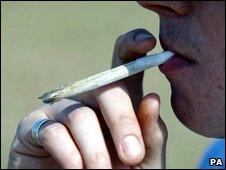Opinions toughen on cannabis users and illegal drugs
- Published

The study showed 47% of people knew someone who had tried illegal drugs
Support for legalising cannabis has dropped from more than a third of people in Scotland to less than a quarter, a study has suggested.
However, most people made a distinction between cannabis and other drugs.
The findings come in a Scottish government study into the public's attitudes towards illegal drugs and drug misuse.
It showed 47% of people knew someone who had tried illegal drugs, up from 41% between 2001 and 2009.
Statistics from the British Social Attitudes Surveys in the 1980s and 1990s, along with the Scottish Social Attitudes Survey 2001, indicated an increasingly tolerant attitude towards the legalisation of cannabis.
The results from the Scottish Social Attitudes Survey 2009 have now suggested a reverse in this trend.
Mental health
Support for legalising cannabis fell from 37% in Scotland in 2001 to 24% in 2009. Among those who had themselves tried cannabis, support for its legalisation fell from 70% to 47% over the same period.
The views were accompanied by a hardening of attitudes towards prosecution for the possession of cannabis.
The report found the trend may be linked to the mental health debate surrounding new stronger forms of cannabis, called skunk, or it may reflect a changing trend in attitudes towards illegal drugs in general.
In 2008 the government introduced a new strategy to tackle the nation's drug problems by focusing on "recovery and helping people live drug-free lives".
In principle this appeared to be supported by the Scottish public, with 80% saying "the only real way of helping drug addicts is to get them to stop using drugs altogether".
How this should be done was not so clear, the report found.
There was widespread support for enforcement, with only 16% of people agreeing that personal use of heroin should not result in prosecution.
Although education was generally supported as the focus of drugs policy, only 44% of people believed this "education" should involve young people being given more information on how to use drugs more safely.
The survey also indicated that communities with higher signs of heroin use were more likely to be comfortable living near a recovering heroin user. This may mean that actual contact with such issues helps to allay public anxiety, it suggested.